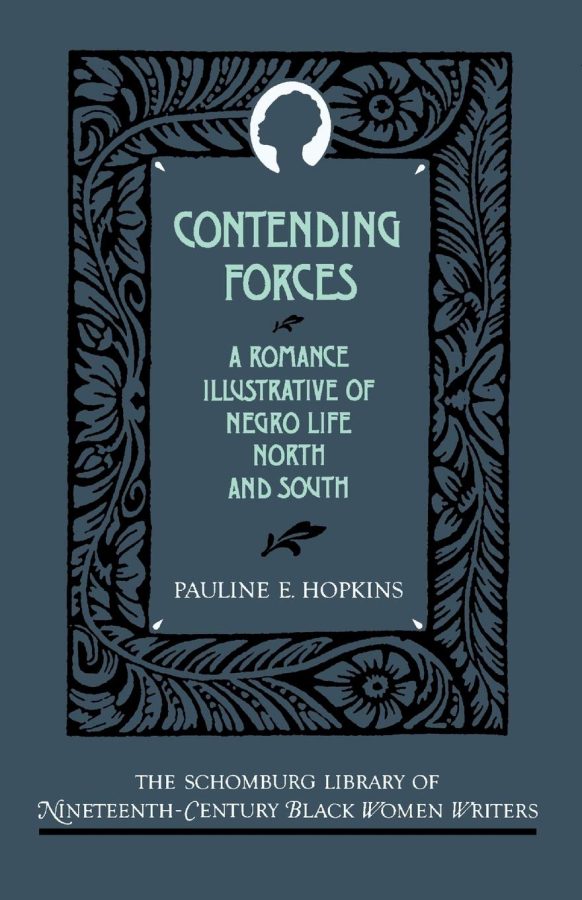REVIEW: Pauline Hopkins’ Contending Forces should be leading the literary canon
November 19, 2022
“Contending Forces” by Pauline Hopkins is a masterpiece – not in the same way or as much so as “Beloved” by Toni Morrison or “Things Fall Apart” by Chinua Achebe I would argue – but nonetheless, a masterpiece. The novel, written in 1900 but published to be a part of the Schomburg Library of Nineteenth Century Black Women Writers in 1988, tells the story of a Black family both before and after slavery ended in the United States. It chronicles the family’s history and their lives as Black people in America less than a century removed from their family members having been enslaved.
The novel begins with the story of the Smith family’s ancestors. They are people who move to the country to perpetuate slavery, until ironically, some of them become enslaved. But Jesse, the Smiths’ ancestor, escapes and travels north to Boston, where he, a biracial man, meets a Black woman and raises a Black family.
The novel soon flashes forward to picture the Smith family: Ma Smith and her children, Dora and Will. The family is focused on paying the mortgage on their home. They do well. They are educated. They are, in practice, what Maya Angelou once said: “I am the dream and the hope of the slave. I rise…”
Hopkins uses Dora and Will, among other characters in her novel to tell the story of Blackness before anyone really understood what Blackness, as we understand it now, was. The family is a symbol of hope, and the ease with which Hopkins tells their story as people living a domestic life amid a history and present reality of tragedy, tells us everything we need to know about Blackness – that resilience is its backbone.But Hopkins, in some ways, is a little too light on the tragedy. Dora and Will, among others, are indeed living a domestic life, but at the turn of the century, freedom was hard to come by. The life led by Black people in America was one ruined by the outright violence of the oppressor.
That being said, I respect and honor Hopkins choice to tell a domestic story, for her characters are defined by their own actions and relationships and choices – not solely by their histories and pasts.
As the novel moves forward, more aspects of the domestic lives of the characters are told, and one of these includes a revelation that Sappho, a biracial woman, who is a boarder at the Smith house and Will’s love interest, comes from the South. She is a woman born of a different name who was exploited and raped to bear a child by her white uncle. She as a character embodies the shame that Black women who were exploited at the time were made to feel. She blames herself and is embarrassed of having a child, despite the fact that the fault is obviously not hers. And before running into Will in New Orleans years later, Sappho trades everything to run away from this revelation and reality. The embarrassment and shame is too great a cross to bear, and she thinks everyone will hate her for knowing her truth.
She abandons Will as the love of her life because of this, but Hopkins won’t let this queen lose her crown. They run into each other, literally, at a convent, and they marry. The novel ends with the two entranced in each other’s presence. Hopkins couldn’t let her characters lose out on love and passion because of tragedy and exploitation. This is a story of perseverance and one of getting back your stolen identity. It is one of running until you can’t hide anymore and finally lifting the veil to embrace and accept your truth, despite the devastating reality that you can’t control it.
“Contending Forces” is a story of power, and Hopkins’ name should rise to the top of every mind when we think of literary genius. Hopkins approaches the end of the novel with the following quote, in reference to Will and Sappho: “United by love, chastened by sorrow and self-sacrifice, he and she planned to work together to bring joy to hearts crushed by despair.”
Hopkins stands strong as a voice of pride, in which she presents the rewritten story of her community, in which Black people in a post slavery America get to be more than victims of tragedy – a reality we all need to take as seriously as physically possible. Humans are and should always be people in the present before their histories of exploitation ever have the chance to take their names away.









